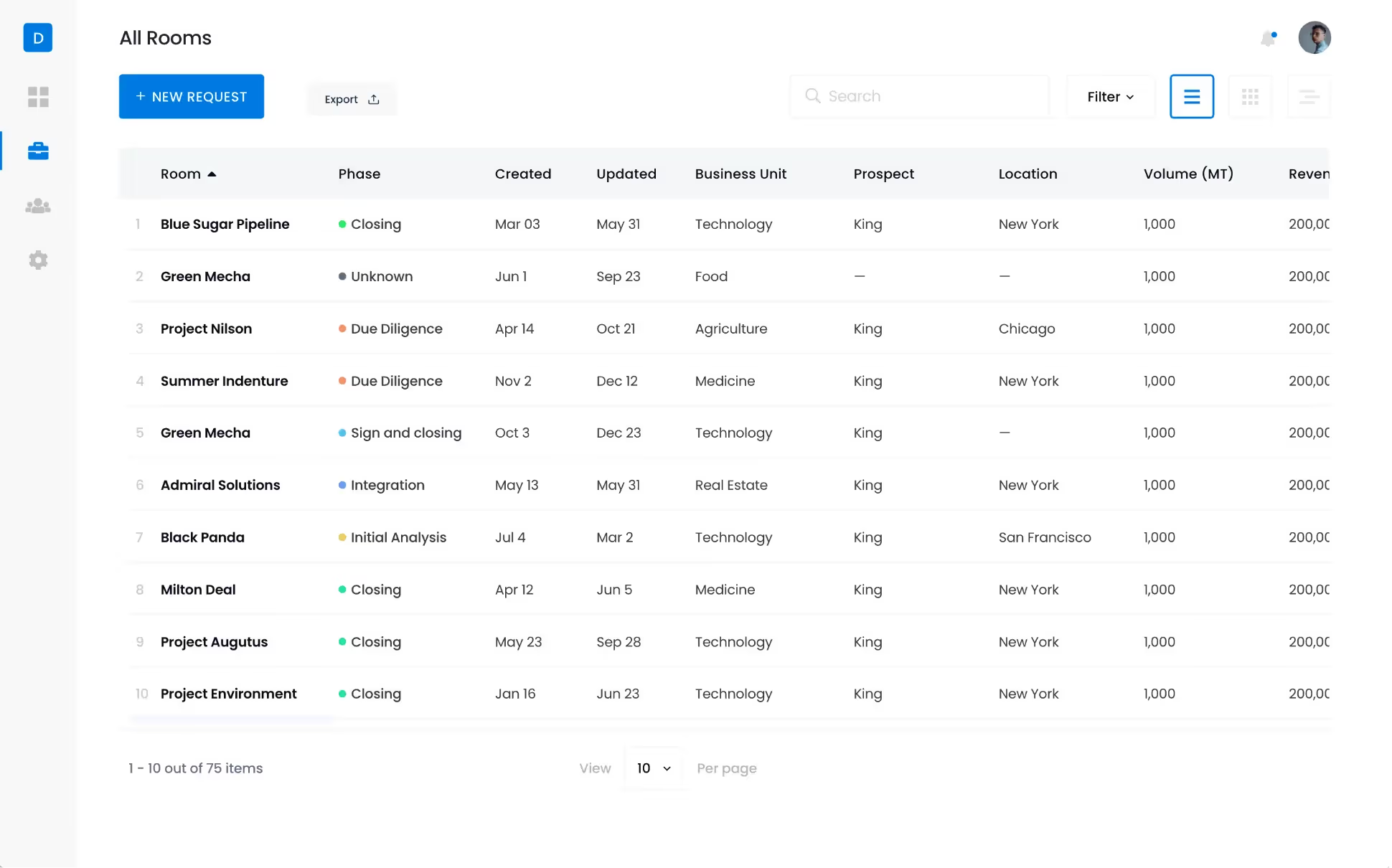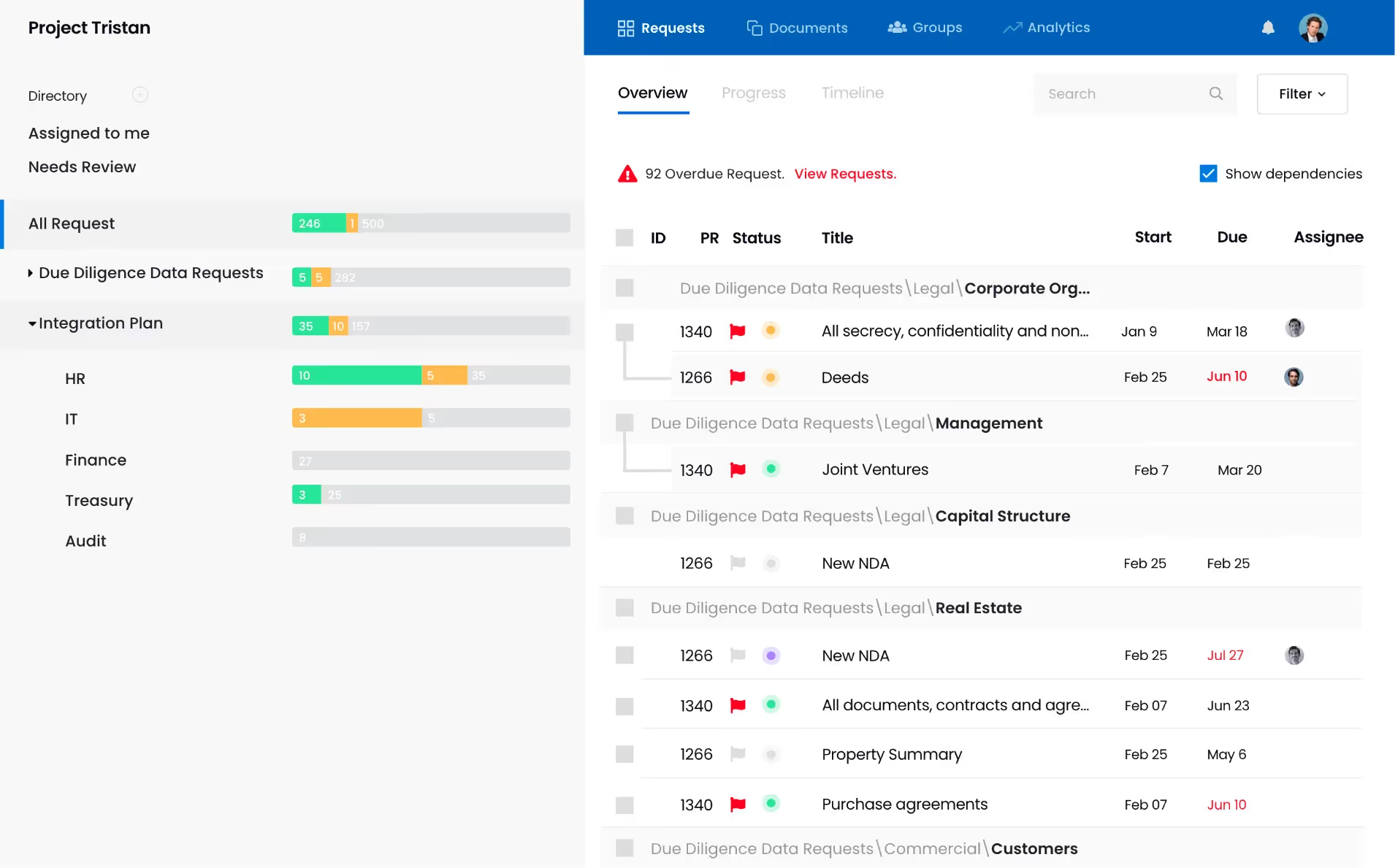The Complete Guide to M&A Project Management


Globally, nearly $1 trillion M&A transactions were closed in 2021. On its own, this number is huge. But the work involved in closing this many transactions is truly astonishing.
Working with M&A practitioners, DealRoom has been witness to the often superhuman effort that goes into the analysis, coordination, and communication involved in ensuring deals get over the line.
This is why project management plays such an important role in M&A.
The more coherent the process involved in making the transaction a reality, the more likely that it will yield positive incomes.
M&A project management seeks to provide this coherency, allowing practitioners to gain a clear picture of the transaction as it is unfolding, enabling them to change direction if required.
This is the complete guide to how it works with useful links to industry experts materials.
What is M&A Project Management
M&A project management is the application of project management practice to mergers and acquisitions. The team leader of any M&A transaction is effectively a project manager. M&A project management seeks to provide them with a framework that allows them to navigate the deal to a successful conclusion.
The complexity that comes with even smaller transactions means that, without this framework, companies are unable to maximize value from the deal.
M&A project management attempts to overcome this by designating roles and responsibilities, setting workflows and timelines, and ultimately, defining standards and objectives.

Laying the Groundwork for M&A Project Management
Before getting into the details, it’s important to note that M&A project management tends to thrive in structured environments.
Any company which is about to implement an M&A project manager to oversee their transaction should first ensure that the following are in place:
- A strategic plan for the company
- General M&A goals (ideal target size, geography, number of transactions, etc.)
- Relevant M&A policies and procedures
- Assessment of readiness for M&A
- Trusted M&A partners (e.g. external legal counsel, advisors, etc.)
Why is M&A Project Management Important?
Mergers and acquisitions in their essence, are large corporate projects. Like any project, the success ultimately depends on how well they are managed. Large corporate projects do not just happen. They require coordination, collaboration, planning, and control.
Underlining this importance, research conducted by the Project Management Institute (PMI) in 2017 showed that 92% of projects that were deemed a success had implemented project management best practice, compared to a success rate of 33% for those companies with no such procedures in place.
What Does an M&A Project Management Manager Do?
M&A Project Managers oversee M&A transactions from start to finish. This means that their responsibility begins at target identification and concludes at the post-merger integration (PMI) phase.
At each step of the transaction, they are expected to coordinate everything from internal responsibilities, hiring from outside, and the company’s interactions with the target company stakeholders.
Experienced M&A Project Managers generally have a method of working that provides them with a rough idea of how long each step of the process will take and what resources will be required.

M&A Project Managers are thus expected to ‘wear several hats at once’. Some of the capabilities that will be required include:
- Leadership: It’s not difficult to see how being the manager of a project that could dictate the success of the company for several years to come requires solid leadership skills. With at least two companies involved in any M&A transaction, a significant part of the success of any deal is managing people.
Useful resources:
Developing Leadership In M&A
Tone at the Top - Intersection of Leadership and Culture in M&A
The Role Of Leadership In Mergers & Acquisitions
- Communication: Closely related to leadership, the M&A project management process involves so many different stakeholders from both companies, that its success is pinned on good communication. Good M&A project management software (insert link) can aid this.
- Cost Management: M&A transactions can become expensive exercises in themselves, even before the deals are closed. An essential task of any M&A project manager is to ensure that costs are kept under control, and that maximum output is achieved from as few resources as possible.
- Quality Management: With so many moving parts to a transaction, it is easy to compromise quality for elements of the transaction which appear less important. The M&A project manager’s role is to ensure maximum quality at every stage, ensuring the deal generates as much value as possible.
- Planning: Closely related to quality management and cost management skills, are the M&A project manager’s planning skills. This means knowing how much resources to dedicate to each stage of the project, how long these projects should take, and what the contingencies are likely to be.
- Information Management: The information generated by any M&A transaction has the potential to become overwhelming if not management properly. M&A Project Managers would be well advised to leverage good virtual data room providers to help them to avoid information overload.
6 Critical Processes of Good M&A Project Management
- Setting objectives for each stage of the process
- Collaboration
- Due Diligence
- Objective Analysis
- Risk Management
- Phase-Gate Process
1. Setting objectives for each stage of the process
Everybody knows that the ultimate goal of M&A is to close a transaction, but what are the smaller objectives that precede this outcome? The M&A Project Manager will define these before any process starts.
Useful resources:
Turning Deal Thesis Into Integration Objectives
How to Set Clear M&A Objectives: M&A Advice from a Former Marine
Aligning Strategy with Your M&A Process
2. Collaboration
Most workflows in the M&A process involve the collaboration of different parties to some extent. Due diligence involves everybody - on both sides of the transaction. Good M&A project management therefore inevitably requires strong levels of collaboration.
Useful resources:
How Emerson Improves Collaboration with DealRoom
Bridging the Gap Between Corporate Development and Integration
3. Due Diligence
DealRoom has stressed at length the importance of good due diligence to successful M&A outcomes. Any transaction that is successful without a thorough due diligence process was successful purely because of dumb luck, not good process.
Useful resources:
Due Diligence Process in 6 Easy Steps
How to Efficiently Conduct HR Due Diligence
M&A, Due Diligence & Integration From Attorney's Viewpoint
4. Objective Analysis
There are often irrelevant reasons to continue an M&A process: Liking the company (for myriad non-business reasons), having an affinity with its management, or being too far down the road to go back. Cold, objective analysis is crucial to ensure good decisions are taken.
5. Risk Management
Constant vigilance should inform everything that happens in the M&A process. While it’s easy to see how an acquisition can add to the top line, good project management essentially acts as the Devil’s advocate, keeping one eye on risk as the project advances.
Useful resources:
10 Most Common M&A Risks and Ways to Mitigate Them
M&A Risk Management Basics & How To Prevent Deal Fever
How To Identify Potential Risks During Software Transactions
6. Phase-Gate Process
The phase gate process is a technique used in M&A project management whereby the project is divided into phases, which are separated by decision points. Conclusion of each phase is decided by someone appointed by the M&A project manager (see next section).
Implementing a Phase-Gate Process in M&A
Many M&A Project Managers implement a phase-gate process to get deals over the line.
Each stage of a well conducted M&A project should have an objective (or objectives) that need to be met before moving onto the next. These can be broken into overarching objectives - which tend to be the case when drawing up a longlist - and micro objectives, where more detailed, careful assessment is required.
A well designed phase-gate process is composed of each of the following stages:
1. Strategy Approval Stage
The M&A project manager works with the company’s corporate development officer, strategy manager, or vice-president, to set the criteria for potential acquisition targets.
In the phase-gate process, only those companies that meet these criteria can be considered. Other issues to be considered at this stage include the likelihood of the target company owners being open to a deal, and how compatible the target company’s culture is with your own.
2. Intermediate Stage
The intermediate stage, sometimes referred to as the approval-to-negotiate phase, encompasses a full valuation of the target company, all of the due diligence phases (each governed by their own individual phase-gate processes), and even some issues around the post-transaction integration.
Ultimately, the output from this phase is a nonbinding letter of intent, a clear roadmap for how the company approaches negotiations with the target, and an outline of confirmatory due diligence.
3. Deal Approval Stage
The deal approval stage is essentially a continuation of the intermediate stage, with most of the remaining issues (confirmatory due diligence), approval from the board of directors, regulatory clearance, and post- due diligence valuations.
At this stage, there are no new issues to raise, but it does provide everyone with a good opportunity to speak up if they believe, for whatever reason, that a transaction should not go ahead.
M&A Project Management Tools
Any company that is developing its M&A project management capabilities would be foolhardy to do so without technology. There are a growing array of capable software solutions that can help companies to navigate their M&A journey more efficiently.
DealRoom has been developed for the M&A community, having consulted with some of the world’s most prolific dealmakers. Its package includes:
1. Pipeline management
DealRoom’s Pipeline Management tool was developed in collaboration with M&A project managers. Teams can access all of the deals in their pipeline using the tool’s deals dashboard.
The strength of the Pipeline Management tool is that it gives M&A practitioners an overview of all their M&A activity and how each deal relates to the others, rather than treating each deal separately.

2. Due Diligence management
We understand the importance of a strong due diligence process for successful transactions. We have worked with hundreds of M&A practitioners to develop what we believe is the most comprehensive suite of tools on the market for due diligence.
Diligence teams gain access to extremely detailed checklists and industry-specific guidelines, that give them confidence in their due diligence process. The DealRoom diligence tool also allows fast and easy communication between deal participants, including the tool’s unique request function, where new documents or information can be requested using an easy-to-use template.

3. Integration management
In many ways, the hard work for deal participants begins when the transaction closes.
DealRoom’s Integration Management empowers users to take control of the process even before deal closing. It divides the process into a series of workflows and timelines, ensuring that every component of the post-merger integration is addressed as efficiently as possible.

Taking all three tools together, DealRoom provides its users with a fully integrated M&A project management platform that provides a roadmap from deal origination all the way through to a comprehensive integration of the target company.
Talk to us today about how our M&A Project Management solution can turbocharge your M&A experience.

Get your M&A process in order. Use DealRoom as a single source of truth and align your team.





.png)
.png)
.png)
.svg)

.svg)
.avif)


